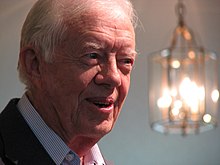Palestine - peace, not apartheid

Palestine - Peace, Not Apartheid (Original title: Palestine Peace Not Apartheid ) is the title of a book by Jimmy Carter , which was published in November 2006. It contains Carter's view of the Middle East conflict .
content
Carter describes Israel's policy in the occupied areas of the West Bank as the "system of apartheid ". “Two peoples sit on the same land, but completely separated from each other. The completely dominant Israelis suppress violence by depriving the Palestinians of their most basic human rights ”(in the original: a system of apartheid, with two peoples occupying the same land but completely separated from each other, with Israelis totally dominant and suppressing violence by depriving Palestinians of their basic human rights ). Carter said the primary purpose of the book was to present the facts about the Middle East, to re-ignite the discussion and to help restart peace talks so that peace can finally be reached between Israel and its neighbors.
Reactions
After the book initially received little attention in the US mass media, a heated controversy arose in the USA in December 2006 over Carter's book, in which he blames Israel for the unresolved Palestine conflict. While denouncing Israel's actions as inhuman and contrary to international law, he accuses his own country of uncritical partisanship for Israel's interests. Several public figures and representatives of various organizations distanced themselves from Carter's theses and accused him of one-sidedness and incorrect information.
Some critics accused Carter of playing down the Holocaust because he only cursively mentioned it twice in his book and publicly referred to the living conditions of the Palestinians as "one of the worst examples of the robbery of human rights" in the world. In the introductory chronology of the "most important events that led to the current state of affairs" (in the original: "important events that have led to the existing state of affairs"), Carter simply left out and supported the Second World War and the Holocaust so the denial of the Holocaust .
Yossi Beilin , one of the most prominent left-wing politicians in Israel and a former member of the Knesset , said that many of the problems Carter described had long been an issue in Israeli society. He feels that Carter's apartheid comparison is "unacceptable"; however, it could be understood as a warning that ongoing conflict would deepen the rifts in society.
In the Los Angeles Times , Carter claimed that it was "political suicide for a politician to advocate a balanced stance on the Middle East conflict." In a CNN interview, he even spoke of a "tremendous intimidation in our country that mutes the press" (in the original: tremendous intimidation in our country that has silenced the media ).
literature
- Jimmy Carter: Palestine Peace Not Apartheid. Simon & Schuster, New York 2006, ISBN 978-0-7432-8502-5
- Jimmy Carter: Palestine - Peace, Not Apartheid . Melzer Verlag, Neu-Isenburg 2010, ISBN 978-3-9813189-8-2
Web links
- Jimmy Carter Man from Plains . A Jonathan Demme documentary focused on Jimmy Carter's reading tour of his book Palestine Peace Not Apartheid . USA 2007
Individual evidence
- ↑ quoted from Robert Fisk : Banality and barefaced lies . In: The Independent , December 23, 2006. Retrieved June 13, 2010.
- ↑ Jimmy Carter: Israel, Palestine, peace and apartheid In: The Guardian , December 12, 2006. Retrieved June 13, 2010
- ↑ Jimmy Carter: Palestine Peace Not Apartheid. Historical Chronology. New York, 2006. Quoted from the Amazon Kindle edition
- ^ A b Deborah Lipstadt: Jimmy Carter's Jewish Problem . In: Washington Post , January 20, 2007. Retrieved June 13, 2010
- ↑ Yossi Beilin: Carter Is No More Critical of Israel Than Israelis Themselves , The Forward, January 19, 2007